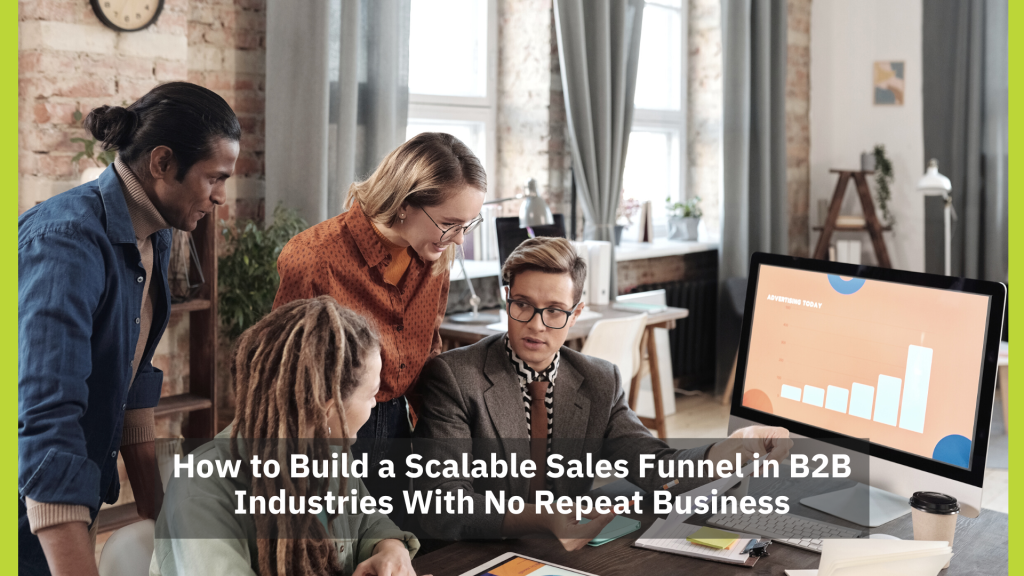Understand the Zero-LTV Reality –
Some B2B industries operate with no expectation of repeat customers. Whether it’s custom-built machinery, one-off construction projects, or specialized consulting, clients often make a single purchase and never return. This eliminates the usual reliance on customer lifetime value (LTV), making every deal a make-or-break opportunity.
In this environment, you need to build a funnel focused on single-sale profitability. That means no wasted time, no nurturing leads for months, and no margin for error. The funnel has to be efficient, measurable, and repeatable—because your system is what scales, not your customer base.
Key focus areas:
- Shift from LTV to profit-per-deal
- Prioritize sales velocity and efficiency
- Avoid over-investing in post-sale processes
Generate Only High-Intent Leads –
With no second chance at revenue, lead quality becomes your biggest asset. Every unqualified lead you chase costs time and money you can’t recover. Your acquisition strategy should focus on attracting or identifying buyers who are ready to purchase within a short window.
This requires better targeting and filtering. Use tools and tactics that prioritize intent signals—like job titles, buyer behavior, or search keywords—over broad visibility. Your funnel should be built to filter in the right people fast, not just attract traffic.
How to improve lead quality:
- Run search ads on high-intent keywords
- Use B2B data tools to build targeted lists
- Gate relevant assets (like pricing guides) behind forms
Simplify the Sales Process –
In zero-repeat industries, a long, complicated sales cycle cuts directly into your margins. You don’t have time to wait out a six-month deal. A scalable funnel here is a simple, fast, and focused one, with as few steps as possible between lead and close.
That doesn’t mean rushing the buyer—it means removing friction. Automate your follow-ups, use pre-built proposal templates, and qualify leads early. Make it easy for buyers to say yes without extensive back-and-forth.
Ways to streamline your funnel:
- Pre-qualify leads before the first call
- Use booking tools to speed up scheduling
Standardize Your Sales Workflow –
If your product or service is one-time-use, your process is what must repeat. Scalability depends on having a system that works consistently across deals, not one that changes with every rep or customer. Build and document a clear, step-by-step sales process that every team member follows.
From lead intake to deal close, your funnel should look the same every time. Use CRM tools to track performance and identify weak points. When your process is standardized, you can scale volume without sacrificing efficiency or oversight.
What to standardize:
- Lead intake forms and qualification criteria
- Discovery call structure and questions
- Proposal and pricing formats
Leverage Referrals and Social Proof –
Even if customers don’t return, they can refer others. That’s why word-of-mouth becomes a key growth lever in low-LTV industries. A scalable funnel doesn’t end at the sale—it ends when that customer becomes your promoter.
Make referrals easy. Ask for them explicitly. Build testimonials into your workflow. And follow up post-project with requests for case studies, reviews, or introductions.
Boost top-of-funnel through referrals:
- Send follow-up emails asking for reviews
- Add “refer a colleague” CTAs to thank-you messages
Conclusion –
In B2B industries with no repeat customers, your growth depends entirely on systems, not relationships. You’re not building loyalty—you’re building precision. To scale, focus on optimizing each stage of your funnel for speed, clarity, and efficiency.
With the right lead targeting, a simplified process, and a repeatable sales engine, you can build a high-growth B2B business—even if your customers only buy once.

